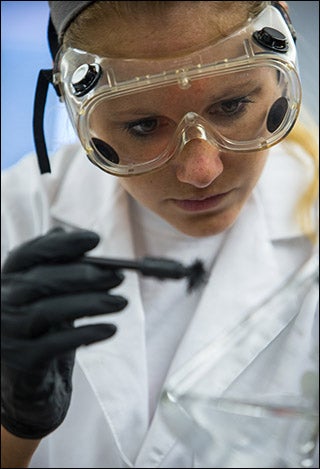EVIDENCE IS IN
New ECU forensic science degree prepares students for profitable careers
A new degree program at East Carolina University gives students an edge – and potentially higher salaries – in careers requiring skills in forensic science and crime scene investigation.
The ECU bachelor of science in multidisciplinary studies with a focus on forensic science requires more coursework in chemistry and criminal justice studies than any other program in the state, enabling ECU graduates “to compete for the top salaries,” said Anthony Kennedy, chemistry professor and director of ECU’s forensic science program.
“Salaries for graduates with chemistry backgrounds are higher than those trained in biological sciences or other specialty areas,” Kennedy said.

ECU student Margaret Whittemore performs an experiment in the forensic lab at ECU.
The total 123-credit-hour program includes 30 credit hours in chemistry, 18 hours in criminal justice, 17 hours in biology, seven in anthropology and 51 in humanities and social sciences. Those requirements are designed to supplement the skills required in a forensic laboratory setting.
With the extensive program requirements, “I would argue that our students are better equipped to work in state and federal labs,” Kennedy said.
A forensic science degree is appropriate for students considering a career in a state, federal or private forensic lab, or for students interested in obtaining advanced degrees in forensic science, Kennedy said.
Forensic science technicians help investigate crimes by collecting and analyzing physical evidence. At a crime scene, technicians may take photographs, sketch the crime scene, record and collect evidence (including weapons, fingerprints or bodily fluids) and catalog and preserve evidence to be transferred to a lab. In the lab, technicians may perform chemical, biological and physical analysis on evidence taken from the crime scene, explore links between suspects and criminal activity, consult with experts in related fields and reconstruct the crime scene.
Many technicians specialize in either crime scene investigation or laboratory analysis, and most develop written reports so effective communication skills are critical. A forensic science technician must be able to explain their findings to lawyers, detectives and other law enforcement officials. They may also be called to testify in court.
According to the Bureau of Labor Statistics Occupational Outlook Handbook, forensic science technicians earned a median annual income of $52,840 in 2012, and employment in the field is expected to grow 6 percent through 2022.
The ECU degree is offered through the Multidisciplinary Studies Program in the Thomas Harriot College of Arts and Sciences with support from the Department of Criminal Justice in the College of Human Ecology. ;
For additional information about ECU’s forensic science program, contact Kennedy at 252-328-9816 or kennedyan@ecu.edu or visit the program website at http://www.ecu.edu/cs-cas/chem/old/Forensics.cfm.